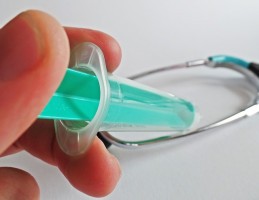
The three-year follow-up results from the Phase 3 CheckMate -816 trial have demonstrated sustained clinical benefits with three cycles of nivolumab in combination with platinum-based chemotherapy for the neoadjuvant treatment of patients with resectable non-small cell lung cancer (NSCLC).
With a median follow-up of 41.4 months, nivolumab with chemotherapy reduced the risk of disease recurrence, progression or death by 32%, demonstrating a landmark three-year event-free survival (EFS) rate of 57% with nivolumab with chemotherapy compared to 43% with chemotherapy alone (Hazard Ratio [HR], 0.68; 95% Confidence Interval [CI], 0.49 to 0.93).
Additionally, time to distant metastasis or death (TTDM), defined as the time between the date of randomisation and the first date of distant metastasis or the date of death in the absence of distant metastasis, continued to favour nivolumab with chemotherapy compared to chemotherapy alone (HR, 0.55; 95% CI, 0.39 to 0.78), with three-year landmark TTDM rates of 71% vs. 50%, respectively.
While overall survival (OS) remained immature at this analysis, there was a continued encouraging trend in OS favouring neoadjuvant nivolumab with chemotherapy over chemotherapy alone (HR 0.62; 99.34% CI: 0.36 to 1.05).
At three years, 78% of patients treated with neoadjuvant nivolumab and chemotherapy were alive, compared to 64% with chemotherapy alone. OS will continue to be followed for upcoming analyses. These updated results will be featured in a proffered paper oral session at the European Lung Cancer Congress (ELCC) 2023 from March 29-April 1, 2023.
“These updated results from CheckMate -816 are immensely important, as they show that the addition of nivolumab to chemotherapy provides sustained efficacy over three years when given before surgery and provide hope for the large portion of patients with non-small cell lung cancer facing high recurrence rates and for whom cure is not feasible with surgery alone,” said Nicolas Girard, M.D., Ph.D., CheckMate -816 investigator and professor and head of the Thorax Institute Curie-Montsouris.
“As the first positive Phase 3 trial with an immunotherapy-based combination in the neoadjuvant setting, the results from CheckMate -816 have already contributed valuable knowledge to the scientific community studying resectable NSCLC. Now, with long-term data showing the combination can continue helping to prevent disease recurrence and progression for different types of patients, alongside an encouraging trend of longer overall survival, this regimen is poised to change the way non-metastatic NSCLC is treated.”
Exploratory analyses included EFS by surgical approach, EFS by extent or completeness of resection, and EFS and pathologic complete response (pCR) by a four-gene (CD8A, CD274, STAT-1, LAG-3) inflammatory signature score derived from RNA sequencing of baseline tumour samples. Nivolumab with chemotherapy continues to demonstrate improved EFS benefit at three years vs. chemotherapy in patients who had surgery, regardless of surgical approach or extent of resection, and in patients with R0 resection.
In the nivolumab with chemotherapy arm, baseline four-gene inflammatory signature scores were numerically higher in patients with pCR compared to patients without and patients with higher baseline inflammatory scores appeared to have improved EFS with the combination, relative to those with lower scores.
After three years of follow-up, the safety profile of neoadjuvant nivolumab with chemotherapy was consistent with the primary analysis, with no new safety signals observed. Grade 3-4 treatment-related and surgery-related adverse events occurred in 36% and 11% of patients in the nivolumab with chemotherapy arm, respectively, vs. 38% and 15% in the chemotherapy arm, respectively.
“The significant and sustained results from CheckMate -816 reinforce our commitment to research in earlier stages of cancers and our excitement around finding new options for earlier treatment, including in thoracic cancers with high remaining unmet needs like resectable non-small cell lung cancer,” said Abderrahim Oukessou, M.D., vice president, thoracic cancers development lead, Bristol Myers Squibb.
“At BMS, we’ve been at the forefront of this transformational science and are proud to see additional data supporting the potential of immunotherapy-based approaches, including for the first time in the neoadjuvant treatment of resectable NSCLC with the science now translating to durable, long-term outcomes for patients that can reduce their risk for recurrence, progression and death.”
The pCR data from CheckMate -816 were initially presented at the 2021 American Association for Cancer Research (AACR) Annual Meeting. The EFS results and preliminary OS data were presented at the 2022 AACR Annual Meeting. Additionally, primary analyses of pCR, EFS and preliminary OS data were previously published in the New England Journal of Medicine. CheckMate -816 is ongoing to assess key secondary endpoints, including overall survival, which continues to mature.
Source: BMS